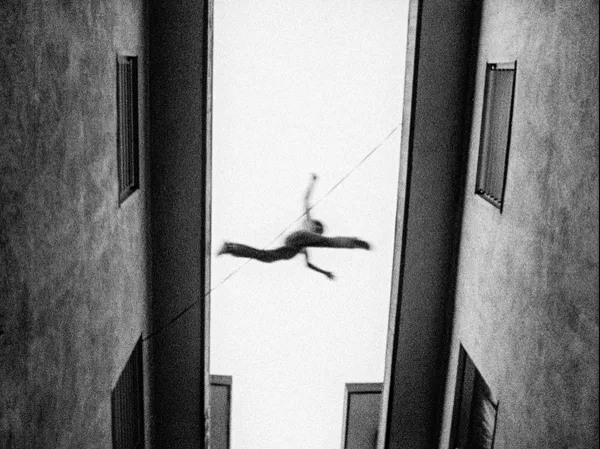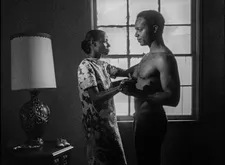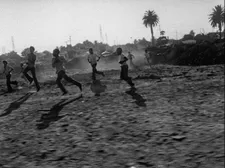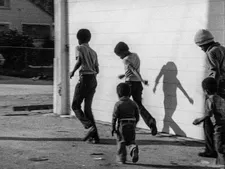 |
| Killer Of Sheep Photo: courtesy of Film Forum |
American director Charles Burnett's 1977 student film and indie classic, Killer Of Sheep, captures a snapshot of everyday life in the Black community. The loosely structured story of vignettes, with a neorealist and semi-documentary sensibility, revolves around Stan (Henry Gayle Sanders), who works at a slaughterhouse. The bloody work is eating away at his soul, and his exhaustion leaves his connection with his wife and children strained. Meanwhile, the kids venture into the streets, where the nature of their reality strips away their innocent sensibilities, as their play is intruded upon by the need to learn how to survive.
Martin Scorsese has said, "Charles Burnett is one of the finest filmmakers in this country. His pictures speak in a cinematic voice that is uniquely and completely his own." In Burnett's 1990 black comedy, To Sleep With Anger, Danny Glover plays the unexpected visitor who brings trouble to the door of an old friend. In 1994's The Glass Shield, two police officers challenge their precincts corrupt culture, while 1999's romantic drama, The Annihilation Of Fish, is filled with sensitive characters in a narrative exploration of fate, mental health and human connection. These are only a few examples of the versatility of Burnett's cinema, which signals his importance to modern American cinema.
In conversation with Eye For Film, Burnett discussed exploring the Black experience and rewriting the history that has been imposed on the Black community. He also reflected on his creative intentions and relationship to music.
Paul Risker: How would you describe your relationship to cinema?
Charles Burnett: I've never thought of it that way. I look at it as a means of communicating what I see happening in the world today, particularly around me, in my neighbourhood, because it has been neglected and unappreciated. Everything I respond to has been to try to portray what was real in the community and be a narrative that responds to the truth to some extent, more so than Birth Of A Nation. DW Griffith distorted one of the most progressive periods in American history — reconstruction.
Particularly now, this Trump guy and the administration are trying to erase all the historical things about Black people — all the positive things, how much we have contributed to this country and how we've been mistreated. When I got into filmmaking, one of the things I was interested in portraying was social change. That was one of the big themes of that period when I was at UCLA. It was to try to say something about what people of colour had gone through and rewrite history.
It's the same thing that pushed neorealism to a point where a group of people that had been lied to so much told you what the truth was. In that sense, a film is supposed to be accurate. It's not so much to entertain, but to say this is who we are as people and let's get to the truth of the matter. And so, that's what film is for me. It's a means of correcting a lot of this and rewriting the history that has been imposed on us.
 |
| Killer Of Sheep Photo: courtesy of Film Forum |
PR: There's the idea that 'history is the lie we agree upon'. So, it's necessary to question the perspective of the historical record. Also, the American film critic Roger Ebert described films as an 'empathy machine'. Cinema can challenge the mainstream news media and take us inside the experiences of others that we would otherwise not have access to. Much of what we're discussing here is the importance of perspective.
CB: Well, one of our struggles here in the States has been to give voice to people who haven't had one and to show who we are. When I screened To Sleep With Anger in Hawaii, a lady came up to me and said, "I didn't know Black people had washing machines," because the only thing they show in Hollywood is Black people and people of colour with drugs and other negative things, like they were uneducated.
I was a victim of that myself, because I remember going to junior high school and the teacher told me Black people can't do this or that, and what they have to offer isn't worth anything. I was told when I was a kid in school that I was not going to be anything. That particularly bothered me in art class when a teacher said, "Egyptians can't draw with a Western perspective."
A producer and I were both invited to the Egypt Film Festival and when we saw the pyramids, when we went to Luxor and to The Valley of the Kings, the art just blew our minds. There was this guy who kept saying that people couldn't have done this, space people did. He couldn't believe an ordinary person, particularly in Africa, an Egyptian, could have that kind of intelligence and know it all to bring these stones that weighed tons and put them on top of these pillars.
People can talk about the Greek statues and columns and so forth, but when you go to Egypt and see the art and what they've done, you realise that France has stolen a lot of that. They brought parts of the pyramid and other things and stored them in the Louvre. Even Picasso took African art and transformed it for Europeans to admire.
So, it was a lesson for all of us, and particularly me, because I had a teacher that didn't know anything about African art or didn't know anything about history. It is our job to correct those misguided people and show people that a lot of science and creativity have come from Africa. So, yes, that's what we are supposed to do with art and film.
PR: There are those films that grow with us and so how we respond to them inevitably changes. Looking back on your mindset when you directed Killer Of Sheep, has your own point of view on the film changed?
CB: The sad part is I haven't seen it often enough recently because it wasn't made to be released theatrically. It was a student film, and I used music that I didn't have the rights to. It wasn't until Dennis Doros and Amy Heller of Milestone Films spent years trying to get the rights to it and to put it out. Now it's beginning to catch on and be seen. I saw it when were trying to do a colour correction and that was the first time I'd seen it in a long time.
What I set out to do with film wasn't to entertain. It was to bring filmmaking to the community and introduce young kids in the Black community to filmmaking — that was the purpose. It was also to look at things from the point of view of social change. When I was coming up in the Sixties, you had the Civil Rights Movement. You had Martin Luther King, and a lot of interested people that wanted to create change in the community. And so, they would prescribe certain things that Black people should do. But these really weren't things that were grounded in reality.
There were sociologists and so forth who would comment on what Black people should be doing, but they were so distanced from the experience. What they would be asking you to do would be an honest attempt at trying to do something, but the source they were using was really abstract.
When I did Killer Of Sheep, I wanted the film to show how people live. Everything in the film was based on actual fact and reality. And so, if you wanted to do something or prescribe what I should do, I would say, "Look at the film, and you will see the people I grew up with. From looking at this, what would you prescribe? What would you say would be a way to make life better for them?"
 |
| Killer Of Sheep Photo: courtesy of Film Forum |
You'll notice that you can't just do one thing. You have to take a holistic approach to education and economics. You have to do a zillion things all at once in order to create improvement. You have to refund the police and restructure. It's all of these things, including education and a belief in humanity, and then you can make a decision. But look at Killer Of Sheep and you tell me what would change Stan's life? I would make changes. I would emphasise education and a whole bunch of things, but I wouldn't know exactly what the proper way of making positive change is. You have to change the government, how people perceive one another, people of colour, and all sorts of things to make it right. So, that was the purpose of making the film like a semidocumentary, because you're looking at the things that I grew up with, what I saw and tried to imitate in the film.
PR: One of the striking things about Killer Of Sheep is the juxtaposition of the children and the adults. They have their own spaces, but they also cross over into one another's. The portrayal of childhood and adulthood, how the two relate to one another, feels genuine.
CB: What I wanted to do was film it from a young person's point of view, and how they grow up to imitate adults. They have this rough and dangerous way of playing when they're kids. They have to learn how to fight and box. Then, ironically, they learn how to be deceptive.
When you're a kid in the neighbourhood, in order to protect your family, your brother or sister, you're told that you have to cross the line. That line is that no matter what your brother or sister does, you have to protect them. "I don't care if he's right or wrong. You don't let anyone harm them or beat them up."
So, you have to be very aggressive, and you have to be insensitive — it's about survival. As a young man, you have to learn how to be unsympathetic in a certain way. It's not a question of right and wrong. It's a question of protecting your family, and that's the only right thing — it's survival. So, as a kid, you learn how to survive in all the wrong ways, and I was showing how young kids learn to be adults, and at the same time, they lose a lot of their sensibilities in doing so.
PR: Is Killer Of Sheep looking at how innocence is ultimately lost?
CB: Yes. It's the only way you can survive. Every kid in my neighbourhood had to learn how to box and fight at a very early age. Every time I stepped out of the house, my neighbour always wanted to box, and other kids and adults wanted to throw us in the ring together. Can you beat so-and-so up? Can you do this and that? So, you were always challenged, and I got all these scars from being hit, but at the same time, it was a kind of fantasy land — it was fun. You prove yourself, and you start at an early age. It was part of the experience of growing up and being in a world where it was very rough and cruel. You just have to keep on trucking and find what is right and what's wrong.
PR: The music has a powerful voice, but there are moments when it takes a step back and lets the character's words carry the film. The relationship between the words, narrative and music is like a meticulously choreographed dance.
CB: Music was such a big part of the community. I learned how to play a trumpet very early. Most of the kids had saxophones, drums, or whatever it was, and we all thought we were going to be either Louis Armstrong, Miles Davis or someone else, because that was the only positive thing we had going for us.
I listened to the Blues all the time because my mother played these old 78 records. I liked what was said, but I didn't understand it. The Blues is something you don't understand until you get older and you have lived through what these older people sung about. It's talking about growing up and what you experience in the south — being mistreated by men and women.
[…] Billy Holiday sings, A Bitter Fruit. It's about a person being lynched, and if you are a Black person from the south, you know what it is. You may not understand it thoroughly because, until you get older, you don't realise how cruel and inhumane it is. But it was an everyday thing where the white community just didn't care because it wasn't an issue for them. It wasn't until relatively recently that lynching was outlawed. In the South, it was a way of keeping people in their place, so to speak.
 |
| Killer Of Sheep Photo: courtesy of Film Forum |
[…] I'm from Mississippi and all the kids in the neighbourhood were from the South. We were always told what we couldn't do if we went to Mississippi. You had to learn how to conduct yourself because your life would depend on it. When Emmett Till's picture was shown in the neighbourhood in Jet magazine, it was like I stopped being a kid. All of a sudden, it wasn't a fantasy world. It wasn't that I couldn't be president, I never had those dreams, but I couldn't be a man in my own neighbourhood. I couldn't enjoy life to the fullest because I didn't have that freedom. Emmett Till's death ended all the fantasies and dreams to some extent.
I wanted to make films that show how people of colour live in circumstances like that, and deep down that's what they feel. Unlike other films that can entertain people and make them enjoy life, here, you have to always be careful where you step and who you're talking to, who you can and can't trust.
Where I live, most of the people in the neighbourhood are mostly Black and Hispanic. So, we didn't get a chance to work with other groups except for Blacks and Hispanics. That's the only communication we had. It wasn't until I got to college that I experienced the diversity in the way LA is multicultural. And so, it's like you're fighting with your hands tied, so to speak. You have these different opinions you hear from Malcolm X and Martin Luther King, and all these other groups that say, this is what you have to do, and this is what you have to be careful of. That's why, when we made films, we people of colour were always trying to find, what is the subject matter and how do we express it. Can we make entertaining films? Is it our responsibility, because we grew up thinking that we had to do something, those who were politicised.
Killer Of Sheep is currently playing in a new 4K restoration print at Film Forum, New York until Thursday April 24th. For more information on theatrical screenings click here.





















